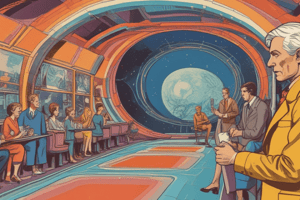Podcast
Questions and Answers
Define Developmental Theory.
Define Developmental Theory.
A person matures through a series of stages that occur in a fixed sequence related to physical, social, and intellectual growth.
Physical skill development is more __________.
Physical skill development is more __________.
sequential in nature (must stand before can walk)
Development lag can be interrupted due to __________.
Development lag can be interrupted due to __________.
disease, poverty, malnutrition, trauma, emotional/social deprivation
Erikson believed that mental health problems occur when __________.
Erikson believed that mental health problems occur when __________.
OT practitioner can set up _______________ _________ to support mastery.
OT practitioner can set up _______________ _________ to support mastery.
Psychosocial refers to __________.
Psychosocial refers to __________.
Approximate Age for Psychosocial Stage: Basic Trust vs. Mistrust?
Approximate Age for Psychosocial Stage: Basic Trust vs. Mistrust?
Approximate Age for Psychosocial Stage: Autonomy vs. Shame and Doubt?
Approximate Age for Psychosocial Stage: Autonomy vs. Shame and Doubt?
Approximate Age for Psychosocial Stage: Initiative vs. Guilt?
Approximate Age for Psychosocial Stage: Initiative vs. Guilt?
Approximate Age for Psychosocial Stage: Industry vs. Inferiority?
Approximate Age for Psychosocial Stage: Industry vs. Inferiority?
Approximate Age for Psychosocial Stage: Identity vs. Role Confusion?
Approximate Age for Psychosocial Stage: Identity vs. Role Confusion?
Approximate Age for Psychosocial Stage: Intimacy vs. Isolation?
Approximate Age for Psychosocial Stage: Intimacy vs. Isolation?
Approximate Age for Psychosocial Stage: Generativity vs. Stagnation?
Approximate Age for Psychosocial Stage: Generativity vs. Stagnation?
Approximate Age for Psychosocial Stage: Ego Integrity vs. Despair?
Approximate Age for Psychosocial Stage: Ego Integrity vs. Despair?
Memorize this: Human beings mature through a series of stages that occur in a fixed sequence. What is the significance?
Memorize this: Human beings mature through a series of stages that occur in a fixed sequence. What is the significance?
Problems occur when developmental tasks are not mastered sufficiently well. What does this cause?
Problems occur when developmental tasks are not mastered sufficiently well. What does this cause?
A developmental lag can be corrected by __________.
A developmental lag can be corrected by __________.
Define Development.
Define Development.
Flashcards are hidden until you start studying
Study Notes
Developmental Theory Overview
- Development Theory posits that individuals mature through a series of stages linked to physical, social, and intellectual growth.
- Growth is sequential; mastery of earlier skills (e.g., crawling) is necessary before progressing to later skills (e.g., walking).
Factors Affecting Development
- Developmental lag can be caused by various factors including disease, poverty, malnutrition, trauma, and emotional or social deprivation.
- Insufficient mastery of developmental tasks can lead to mental health issues, as suggested by Erikson's theories.
Developmental Tasks and Support
- Occupational therapy practitioners can create developmental tasks to support individuals in mastering skills necessary for growth.
- Experiences with these tasks build a foundation for future development stages.
Psychosocial Stages (Erikson's Model)
- Basic Trust vs. Mistrust (Birth - 18 months): Dependence on caregivers; outcomes affect trust in others.
- Autonomy vs. Shame and Doubt (2 - 4 years): Independence in bodily control and exploration influences a sense of motivation.
- Initiative vs. Guilt (3 - 5 years): Children begin planning and executing goals, imitating adults, and developing self-direction.
- Industry vs. Inferiority (6 - 12 years): Skills and work habits are developed; peer comparison shapes self-esteem.
- Identity vs. Role Confusion (Adolescence): Exploration of various roles, vocational choices, and gender identification.
- Intimacy vs. Isolation (Young adulthood): Focus on forming meaningful relationships and partnerships.
- Generativity vs. Stagnation (Middle adulthood): Contribution through work, community involvement, and parenting.
- Ego Integrity vs. Despair (Old age): Life review and assessment against personal goals and accomplishments.
Key Concepts Summary
- Human maturity unfolds in fixed stages; each stage presents specific developmental tasks crucial for future success.
- Unmastered tasks can lead to developmental lags, affecting the ability to tackle future challenges.
- Corrective experiences can help overcome developmental delays when provided the right conditions and guidance.
General Definition
- Development refers to the ongoing maturation process occurring throughout an individual's life.
Studying That Suits You
Use AI to generate personalized quizzes and flashcards to suit your learning preferences.




